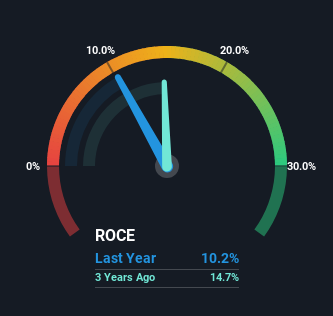- United Kingdom
- /
- Consumer Durables
- /
- LSE:BKG
Here's What's Concerning About Berkeley Group Holdings' (LON:BKG) Returns On Capital
If we want to find a stock that could multiply over the long term, what are the underlying trends we should look for? Typically, we'll want to notice a trend of growing return on capital employed (ROCE) and alongside that, an expanding base of capital employed. This shows us that it's a compounding machine, able to continually reinvest its earnings back into the business and generate higher returns. Having said that, from a first glance at Berkeley Group Holdings (LON:BKG) we aren't jumping out of our chairs at how returns are trending, but let's have a deeper look.
Return On Capital Employed (ROCE): What Is It?
If you haven't worked with ROCE before, it measures the 'return' (pre-tax profit) a company generates from capital employed in its business. The formula for this calculation on Berkeley Group Holdings is:
Return on Capital Employed = Earnings Before Interest and Tax (EBIT) ÷ (Total Assets - Current Liabilities)
0.10 = UK£506m ÷ (UK£6.8b - UK£1.9b) (Based on the trailing twelve months to October 2024).
Therefore, Berkeley Group Holdings has an ROCE of 10%. In absolute terms, that's a pretty normal return, and it's somewhat close to the Consumer Durables industry average of 8.7%.
See our latest analysis for Berkeley Group Holdings

In the above chart we have measured Berkeley Group Holdings' prior ROCE against its prior performance, but the future is arguably more important. If you'd like, you can check out the forecasts from the analysts covering Berkeley Group Holdings for free.
What Can We Tell From Berkeley Group Holdings' ROCE Trend?
In terms of Berkeley Group Holdings' historical ROCE movements, the trend isn't fantastic. To be more specific, ROCE has fallen from 18% over the last five years. However it looks like Berkeley Group Holdings might be reinvesting for long term growth because while capital employed has increased, the company's sales haven't changed much in the last 12 months. It's worth keeping an eye on the company's earnings from here on to see if these investments do end up contributing to the bottom line.
In Conclusion...
To conclude, we've found that Berkeley Group Holdings is reinvesting in the business, but returns have been falling. And in the last five years, the stock has given away 18% so the market doesn't look too hopeful on these trends strengthening any time soon. Therefore based on the analysis done in this article, we don't think Berkeley Group Holdings has the makings of a multi-bagger.
On a separate note, we've found 1 warning sign for Berkeley Group Holdings you'll probably want to know about.
While Berkeley Group Holdings may not currently earn the highest returns, we've compiled a list of companies that currently earn more than 25% return on equity. Check out this free list here.
Valuation is complex, but we're here to simplify it.
Discover if Berkeley Group Holdings might be undervalued or overvalued with our detailed analysis, featuring fair value estimates, potential risks, dividends, insider trades, and its financial condition.
Access Free AnalysisHave feedback on this article? Concerned about the content? Get in touch with us directly. Alternatively, email editorial-team (at) simplywallst.com.
This article by Simply Wall St is general in nature. We provide commentary based on historical data and analyst forecasts only using an unbiased methodology and our articles are not intended to be financial advice. It does not constitute a recommendation to buy or sell any stock, and does not take account of your objectives, or your financial situation. We aim to bring you long-term focused analysis driven by fundamental data. Note that our analysis may not factor in the latest price-sensitive company announcements or qualitative material. Simply Wall St has no position in any stocks mentioned.
About LSE:BKG
Berkeley Group Holdings
The Berkeley Group Holdings plc, together with its subsidiaries, builds homes and neighbourhoods in the United Kingdom.
Excellent balance sheet and fair value.
Similar Companies
Market Insights
Community Narratives



